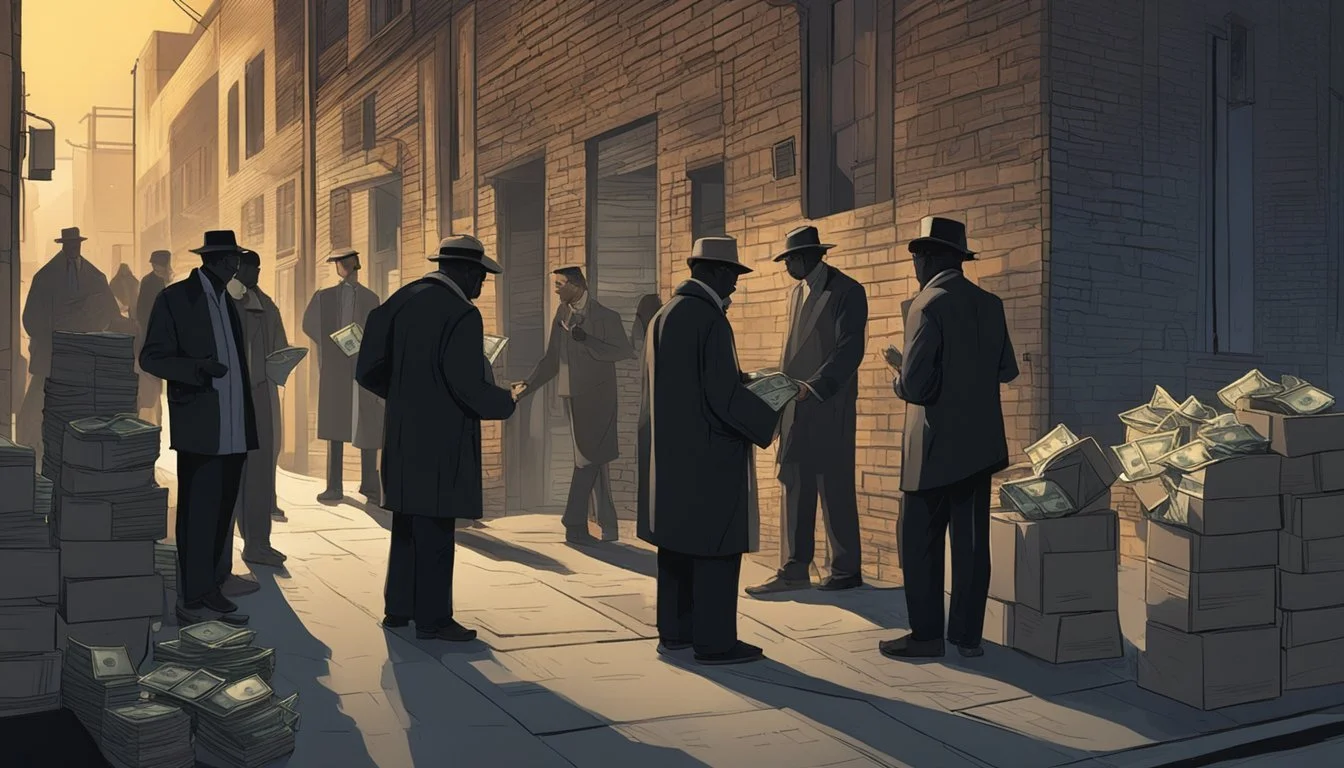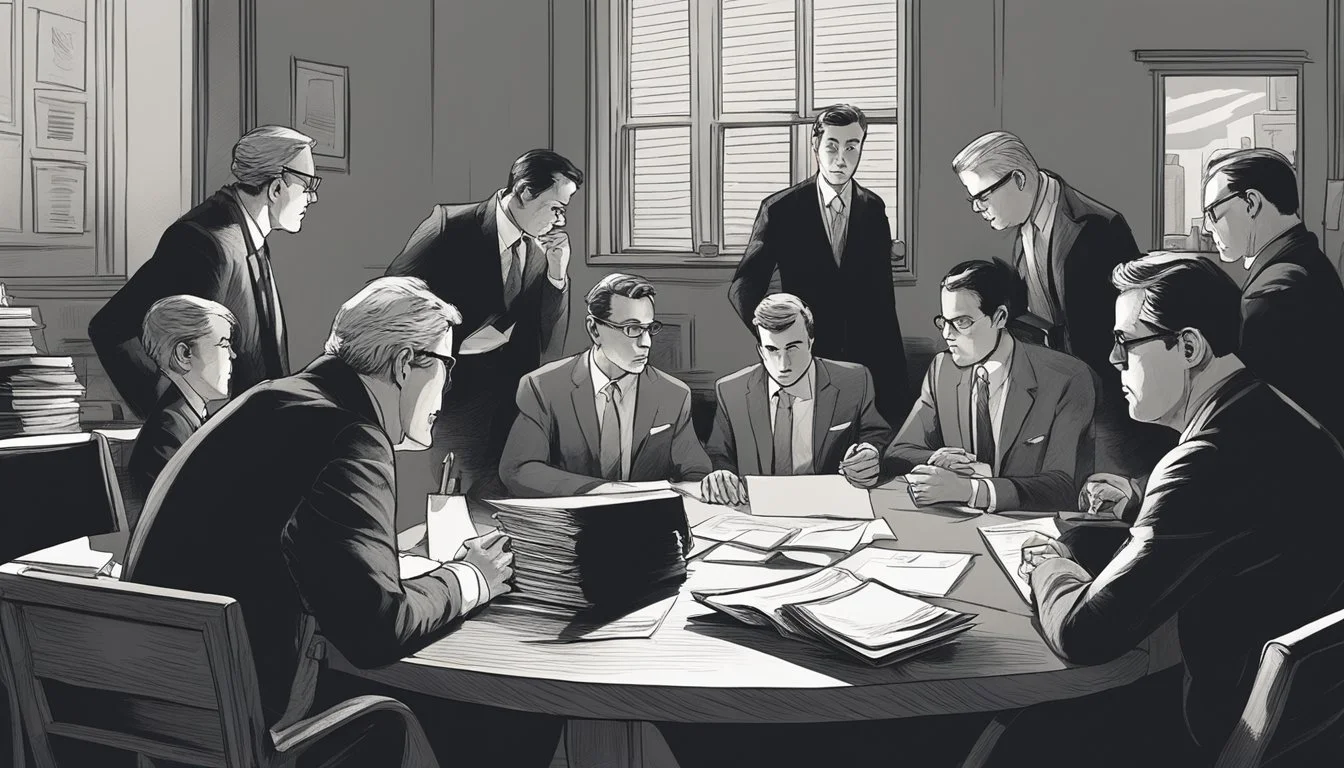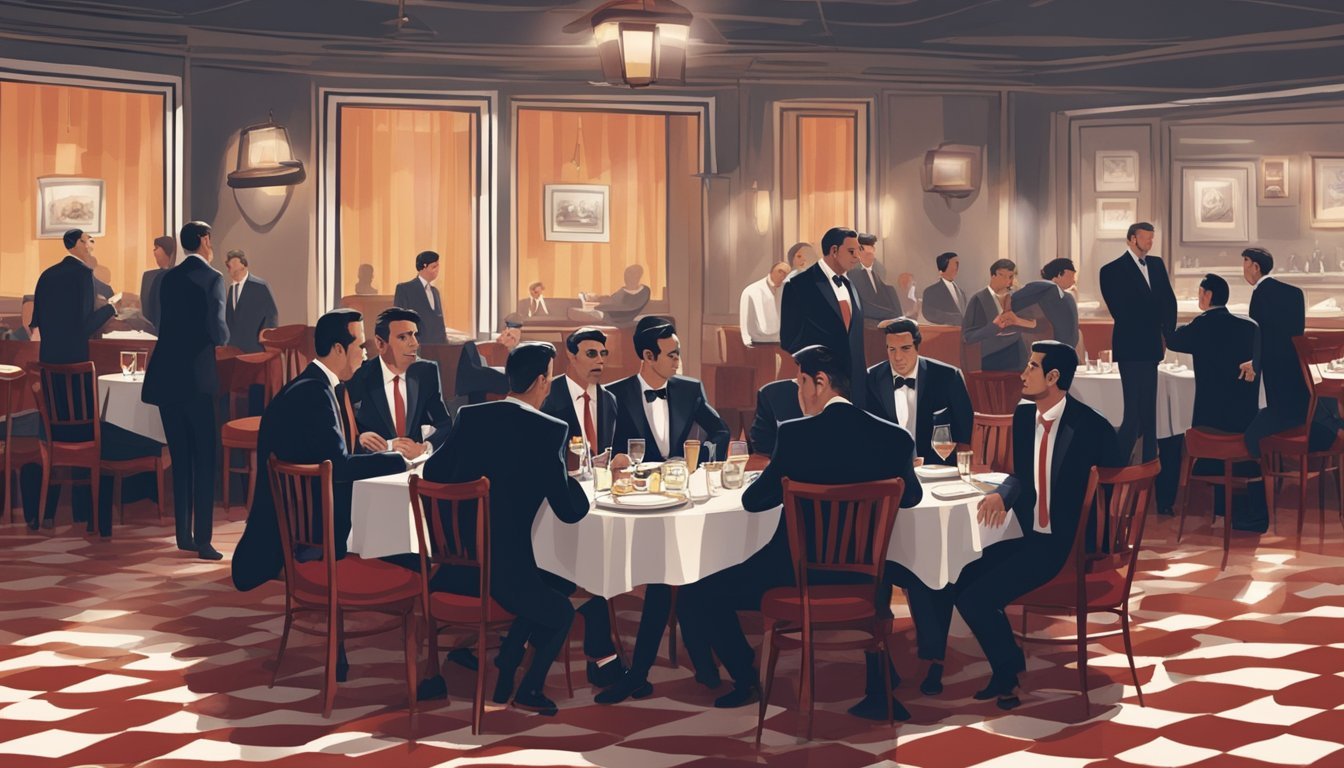The Real Goodfellas: Henry Hill's Life in the Mob
From Wiseguy to Witness
Henry Hill's involvement with the New York City mafia began at a young age. Growing up in Brooklyn, he became fascinated with the glamorous lifestyle of local gangsters and started working for the Lucchese crime family as a teenager. Hill's life as a mobster spanned three decades, during which he participated in various criminal activities including drug trafficking, robbery, and extortion.
His story gained widespread attention after he became an FBI informant and entered the Witness Protection Program in 1980. Hill's experiences were chronicled in Nicholas Pileggi's book "Wiseguy: Life in a Mafia Family," which later inspired Martin Scorsese's critically acclaimed film "Goodfellas." The 1990 movie, starring Ray Liotta as Henry Hill, offered a gritty portrayal of life in the mafia.
While "Goodfellas" provided a compelling glimpse into Hill's criminal career, the real story contains even more twists and turns. From his early days running errands for mobsters to his eventual betrayal of the Lucchese family, Hill's life in organized crime was filled with danger, excess, and moral compromises.
Early Life of Henry Hill
Henry Hill's formative years in Brooklyn set the stage for his future involvement with organized crime. His mixed heritage and exposure to mob culture from a young age shaped his path into the criminal underworld.
Birth and Family Background
Henry Hill Jr. was born on June 11, 1943, in Brooklyn, New York. He grew up in the Brownsville neighborhood, known for its strong mob presence. Hill's father was of Irish descent, while his mother had Sicilian roots.
This mixed heritage placed him in a unique position within the predominantly Italian-American criminal circles. The Hill family lived in a working-class area where organized crime was a visible part of daily life.
Introduction to the Mob
At a young age, Henry Hill became fascinated by the local gangsters he observed in his neighborhood. He started running errands for mobsters who frequented establishments near his family's home.
This early exposure led to his connection with the Lucchese crime family, particularly through Paul Vario, a powerful caporegime. By age 14, Hill was fully immersed in mob activities, working at a cab stand owned by Vario.
His youth and eagerness to please made him a valuable asset to the criminal organization. Hill's introduction to the mob lifestyle set him on a path that would define his adult life and ultimately inspire the film "Goodfellas."
Rise in the Mafia
Henry Hill's ascent in the criminal underworld was marked by key relationships and daring heists. His connections to powerful figures and involvement in major schemes cemented his status as a prominent mob associate.
Working Under Paul Vario
Paul Vario, a Lucchese crime family capo, became Hill's mentor in the mafia world. Hill started running errands for Vario's crew in the 1950s.
He quickly learned the ropes of organized crime, engaging in loan sharking, extortion, and hijacking. Vario provided Hill with protection and opportunities to earn.
Hill's union card as a bricklayer served as a cover for his illegal activities. This allowed him to claim legitimate income while primarily profiting from criminal enterprises.
Becoming a 'Made Man'
Despite his close ties to the mafia, Hill never became a full-fledged "made man" in the Lucchese family. His Irish heritage prevented him from being formally inducted.
Hill operated as a trusted associate, earning significant sums and respect within the organization. He performed various roles, from debt collection to coordinating criminal operations.
His inability to become a made man didn't hinder his criminal career. Hill's skills and connections allowed him to thrive in the mob ecosystem.
The Lufthansa Heist
The 1978 Lufthansa heist at JFK Airport marked a pinnacle in Hill's criminal career. This daring robbery netted nearly $6 million in cash and jewels.
Hill played a crucial role in planning and executing the heist. He provided inside information that made the operation possible.
The success of the Lufthansa job brought Hill immense wealth and notoriety. However, it also led to increased scrutiny from law enforcement and tensions within the criminal organization.
Relations with Jimmy Burke and Tommy DeSimone
Jimmy Burke, known as "The Irishman," became a close associate and mentor to Hill. Their partnership yielded numerous successful criminal ventures.
Tommy DeSimone, a volatile and violent mobster, formed the third part of this criminal trio. Hill often found himself mediating between Burke's calculated approach and DeSimone's impulsive behavior.
These relationships proved both profitable and dangerous for Hill. While they facilitated lucrative criminal activities, they also exposed him to increasing violence and risk.
Criminal Activities and Lifestyle
Henry Hill's criminal career spanned decades and involved a wide range of illegal activities. His involvement with the Lucchese crime family exposed him to various forms of organized crime, from drug trafficking to extortion.
Drug Trafficking and Narcotic Charges
Hill became deeply entrenched in the drug trade, particularly cocaine. He organized large-scale smuggling operations, moving narcotics across state lines and international borders.
His connections within the mob facilitated access to suppliers and distribution networks. Hill's drug activities extended beyond cocaine to include marijuana and heroin.
In 1980, Hill's drug enterprise came crashing down. He was arrested on narcotics charges, marking a turning point in his criminal career.
Extortion and Defaulting Debts
Extortion was a key part of Hill's criminal repertoire. He and his associates would threaten business owners and individuals, demanding payment for "protection."
Those who defaulted on debts faced severe consequences. Hill participated in intimidation tactics, property damage, and even arson to enforce repayment.
His involvement in loan sharking operations provided a steady income stream. High-interest loans trapped victims in cycles of debt, ensuring ongoing profits for the mob.
Glimpse into Organized Crime
Hill's affiliation with the Lucchese family gave him insight into the inner workings of the American Mafia. He collaborated with members of other crime families, including the Gambino and Bonanno organizations.
The Air France Cargo Terminal heist of 1967 was one of Hill's most notorious exploits. This daring robbery netted millions in cash and jewelry.
Hill witnessed firsthand the brutal methods employed by the mob. Murders were not uncommon, with bodies often buried in undisclosed locations to avoid detection.
His Sicilian heritage helped Hill navigate the complex social structures within organized crime. Loyalty and secrecy were paramount, with severe penalties for those who broke the code of silence.
Downfall and Legal Challenges
Henry Hill's criminal career took a dramatic turn in the 1980s as law enforcement closed in. His involvement in drug trafficking and other illegal activities led to multiple arrests and ultimately forced him to make a life-changing decision.
Arrests and Trials
Hill faced several arrests throughout his criminal career. In 1980, he was arrested on drug charges in Queens, New York. This incident marked the beginning of his legal troubles. Despite attempts to evade law enforcement, Hill's luck ran out when he was caught participating in a major narcotics conspiracy.
The FBI had been building a case against Hill and his associates for years. Their investigation focused on drug trafficking operations centered around JFK Airport. Hill's frequent trips to and from the airport had not gone unnoticed.
In 1987, Hill was arrested again for narcotics conspiracy. This time, he faced the possibility of a lengthy prison sentence. The mounting evidence against him left Hill with few options.
The Turning Point: Becoming an Informant
Facing significant jail time, Hill made a decision that would change his life forever. He chose to become an FBI informant. This move offered him protection from both legal consequences and potential retaliation from his former mob associates.
Hill's cooperation with the FBI proved invaluable. He provided crucial information that led to the arrest and conviction of several high-ranking mobsters. His testimony helped dismantle parts of the criminal organization he once belonged to.
As a result of his cooperation, Hill entered the Witness Protection Program. He was relocated and given a new identity to ensure his safety. This transition marked the end of his life in organized crime and the beginning of a new chapter as a protected witness.
Life in Witness Protection
Henry Hill Jr. and his family entered the Witness Protection Program after he agreed to testify against his former mob associates. This decision led to a tumultuous period marked by new identities, relocations, and struggles to adapt to a life away from organized crime.
Testimony Against the Mob
Hill's cooperation with the FBI resulted in over 50 convictions of his former associates. He provided crucial testimony against high-ranking members of the Lucchese crime family, including caporegime Paul Vario and James "Jimmy the Gent" Burke. His information also helped solve the Boston College point-shaving scandal, a major sports betting conspiracy.
Hill's testimony was particularly damaging to the mob's operations in New York. He detailed various criminal activities, including extortion, loan sharking, and drug trafficking. The FBI considered his cooperation invaluable in dismantling significant portions of the Lucchese family's criminal enterprise.
Struggles with New Identity
Adjusting to a new identity proved challenging for Hill and his family. They were required to leave behind their previous lives, connections, and habits. Hill found it difficult to resist his inclination towards criminal activities and substance abuse.
The Hill family faced the constant fear of retribution from former mob associates. This paranoia affected their daily lives and relationships. Karen, Henry's wife, struggled to adapt to their new circumstances, leading to strain in their marriage.
Hill's notoriety made it challenging to maintain a low profile. His inability to fully embrace his new identity often put him at odds with the strict rules of the Witness Protection Program.
Relocations and Violations
The Hills were relocated multiple times due to Henry's violations of program rules. They lived in various locations, including Florida and Seattle. Each move meant starting over, further complicating their adjustment to civilian life.
In 1987, Hill was arrested in Seattle on narcotics charges. This violation led to his expulsion from the Witness Protection Program. He received five years' probation for the offense.
After leaving the program, Hill and Karen separated in 1989. He continued to struggle with substance abuse issues but claimed to have remained clean since his arrest. Hill's post-protection life included public appearances and interviews, where he openly discussed his mob experiences.
Cultural Impact and Legacy
Henry Hill's life story and its adaptation into film and literature have left an indelible mark on popular culture. His experiences in organized crime have shaped public perceptions of the mafia and influenced countless works in entertainment media.
The Film 'Goodfellas'
Martin Scorsese's 'Goodfellas' (1990) brought Hill's story to the silver screen, becoming an instant classic. The film, starring Ray Liotta as Hill, Robert De Niro, and Joe Pesci, earned critical acclaim and six Academy Award nominations. It won Best Supporting Actor for Pesci's performance.
'Goodfellas' revolutionized the crime film genre with its gritty realism and innovative storytelling techniques. The movie's influence extends beyond cinema, impacting television, music, and fashion.
Entertainment Weekly ranked 'Goodfellas' as the best gangster film of all time, surpassing even 'The Godfather'. Its quotable dialogue and memorable scenes have become fixtures in pop culture references.
Book Publications
Nicholas Pileggi's 'Wiseguy: Life in a Mafia Family' (1985), the basis for 'Goodfellas', offered a raw, firsthand account of Hill's life in the mob. Published by Simon and Schuster, the book became a bestseller and is considered a seminal work in true crime literature.
Hill later co-authored 'The Wiseguy Cookbook' (2002), sharing recipes and stories from his time in the mafia. This unique publication blended culinary arts with mob lore, further cementing Hill's status as a cultural figure.
These books have contributed to the public's fascination with organized crime, offering insights into the inner workings of the mafia.
Portrayal in Other Media
Hill's story has been featured in numerous documentaries, TV shows, and podcasts. His life continues to inspire new projects in the entertainment industry.
The 2019 film 'The Irishman', also directed by Scorsese, drew comparisons to 'Goodfellas' and reignited interest in Hill's era of organized crime.
Hill's experiences have been referenced in various crime dramas and comedy sketches, demonstrating the lasting impact of his story on popular culture.
His legacy extends to academic studies of organized crime, with his accounts providing valuable information for researchers and law enforcement.
Henry Hill's Personal Reflections and Death
Henry Hill grappled with his criminal past and sought redemption in his final years. He faced health challenges and made public appearances to share his story.
Remorse and Guilt
Hill expressed mixed feelings about his mob life in later interviews. On the "Howard Stern Show," he admitted to feeling guilt over certain actions. However, he also romanticized aspects of his criminal career.
Hill appeared on "60 Minutes" to discuss his experiences. He revealed regret for involving his family in dangerous situations. The former gangster struggled to reconcile his nostalgia for the mob lifestyle with the harm he caused.
Life After Crime
After entering witness protection, Hill battled drug addiction and legal troubles. He was featured on "Locked Up Abroad," recounting his time in prison.
Hill wrote cookbooks and made occasional media appearances. He leveraged his notoriety to earn a living, selling mob-related memorabilia online.
In his final years, Hill suffered from heart disease. He died on June 12, 2012, at age 69. Despite attempts at redemption, Hill never fully escaped the shadow of his criminal past.





